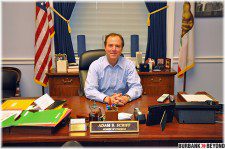Rep. Adam Schiff (D-Burbank) today reintroduced a constitutional amendment to overturn the Supreme Court’s ill-considered opinion in Citizens United, and other Supreme Court precedent, which have made it impossible to regulate the billions in campaign spending unleashed over the last two decades. The amendment also overturns the Supreme Court decision Arizona Free Enterprise Club’s Freedom Club PAC v. Bennett, which struck down an Arizona law that allowed public financing of a candidate if their opponent exceeded certain spending limits.

“With the growth of Super PACs this past cycle, it’s clear that now more than ever we need real campaign finance reform,” said Rep. Schiff. “As a result of the Supreme Court’s artificial distinction between contributions to a candidate and direct expenditures that have the same effect, Super PACs and anonymous donors are the norm rather than the exception. My amendment is simple – it would allow Congress to set reasonable limits, and allow states to set up public financing for candidates, if they choose to do so.
“I have always been loathe to amend the constitution, but the tragic line of decisions by the Supreme Court has severely threatened the very health of our democracy. Something must be done, and we must overturn Citizens United.”
Schiff drafted the legislation last year with Harvard Law Professor Laurence H. Tribe, and pushed to hold hearings on his amendment and others. He was joined today by Michael Capuano, David Cicilline, Sam Farr, John Garamendi, Jim Himes, Barbara Lee, Betty McCollum, Michael Michaud, Jerry Moran, Eleanor Holmes Norton, Charles Rangel, C.A. Dutch Ruppersberger, Chris Van Hollen, and Peter Welch.
The amendment provides simply: “Nothing in this Constitution shall be construed to forbid Congress or the States from imposing reasonable content-neutral limitations on private campaign contributions or independent election expenditures, or from enacting systems of public campaign financing, including those designed to restrict the influence of private wealth by offsetting campaign spending or independent expenditures with increased public funding.”
Schiff is no stranger to campaign finance reform. Elected in 2000, after the most expensive race for the House in history at the time, he became a cosponsor of the bipartisan McCain-Feingold bipartisan campaign finance reform law on his first day in Congress.Citizens United helped overturn critical parts of that and other campaign finance laws.
Laurence H. Tribe is the Carl M. Loeb University Professor and Professor of Constitutional Law at Harvard Law School. Rep. Schiff served as one of his research assistants while a student at the law school in the mid-1980s.





















